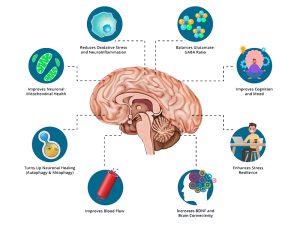
Oxygenation
- Increased Oxygen Supply: Deep breathing has allowed me to feed my cells with more oxygen, potentially enhancing the efficiency with which my mitochondria convert this oxygen into ATP, the energy currency of our cells. This could explain the noticeable surge in my energy levels and physical capabilities.
Stress Relief
- Lowering Oxidative Stress: Through deep breathing, I’ve managed to lower my stress levels, reducing cortisol which in turn might decrease oxidative stress on mitochondria. Cortisol is a stress hormone, and high levels can lead to cellular damage. By managing stress, deep breathing might promote mitochondrial repair and prevent further damage.
Circulation
-
Enhanced Nutrient Delivery: The sensation of energy pulsing through my skin during breathing exercises suggests improved circulation. Better blood flow means more effective delivery of nutrients and removal of waste around mitochondria, supporting their health.
Autophagy Enhancement
-
Supporting Cellular Cleanup: While fasting is known to kick-start autophagy, a process where cells break down and recycle their components, I speculate that deep breathing could enhance this process, particularly mitophagy, where damaged mitochondria are cleared out. This might be playing a role in my health improvements.
pH Balance
-
Optimal Cellular Environment: By controlling CO2 levels through my breath, I might be maintaining the ideal pH for mitochondrial enzymes to work efficiently, ensuring they function at their best. pH balance is crucial for enzyme activity within cells.
Avoiding Modern Toxins
-
Reducing Chemical Load: I’ve eliminated many chemicals, additives, toxins and other substances from my life, which, based on individual studies, can act as endocrine disruptors. These are substances that interfere with hormone systems, potentially leading to health issues. By doing so, I aim to lessen the burden on my mitochondria. Ignoring the cumulative effect of these chemicals can overshadow their impact on mitochondrial function, leading to less energy production and more cellular stress.
Holistic Health Synergy
-
Holistic Health Approach: Combining deep breathing with fasting and clean living might synergistically enhance mitochondrial health, nurturing cellular health at its core.
Conclusion
While the scientific community has yet to fully investigate these connections in humans, my personal experience supports the hypothesis that a holistic approach—combining deep breathing, fasting, and clean living—can enhance mitochondrial health. Deep breathing goes beyond mere relaxation; it’s a fundamental method to nurture cellular health. Every breath has the potential to recharge cells at their core. Although further research is essential to validate these observations, the practice appears to have significantly contributed to my healing journey, enriching both my life and my cells in ways that suggest deep breathing might indeed revitalize mitochondria.

Linda Wulf
Linda Wulf is a cancer rebel, advocate, and independent researcher. Diagnosed in 2023 with primary CNS lymphoma, she declined standard chemotherapy and pursued a root-cause, immune-supporting path. Twenty-three months cancer-free via root-cause approach.










